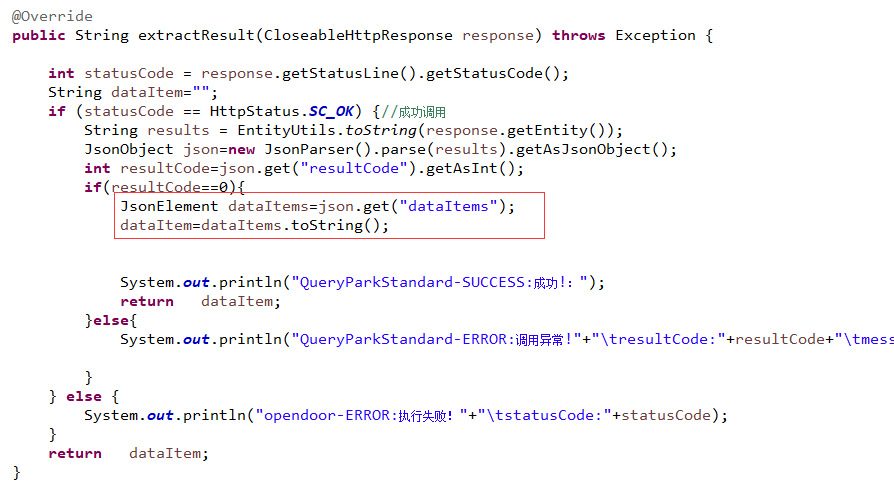停车场收费标准典型案例:
² 返回值:JSON格式字符串
{
"serviceId":"3c.park.queryparkstandard",
"resultCode":0,
"message":"成功",
"dataItems":[{
"objectId":"",
"operateType":"READ",
"attributes":{
"parkCode": "park01",
"parkName": "KKMALL_PARK",
"tempStandard": "临时卡收费标准说明"
},
"subItems": [
{
"objectId": "",
"operateType": "READ",
"attributes": {
"cardType": "月卡A"
},
"subItems": [
{
"objectId": "",
"operateType": "READ",
"attributes": {
"monthPeriod":1,
"money":150
},
"subItems": []
}
]
},
{
"objectId": "",
"operateType": "READ",
"attributes": {
"cardType": "月卡B"
},
"subItems": [
{
"objectId": "",
"operateType": "READ",
"attributes": {
"monthPeriod":1,
"money":100
},
"subItems": []
}
]
}
]
}]
}
下面获得dataItems的内容,及转换
String jsonString= queryParkStandardServices.execute(params,type);
JSONObject jsonobject=new JSONObject();jsonobject.put("json0", jsonString);//如果String是[{},..]这种形式的,可以形成一个新的单json {json0:...}
System.out.println("_________0824----------"+jsonString);
JSONArray jsonarray=new JSONArray();
jsonarray.add(jsonobject);//如果jsonobject里的value是{json0:[{},..]}这种形式的就用JSONArray来承接
JSONObject obResult = (JSONObject) jsonarray.get(0);
JSONArray jsonarray01=obResult.getJSONArray("json0");
JSONObject json01 = (JSONObject) jsonarray01.get(0);
JSONObject partone=json01.getJSONObject("attributes");
String parkCodes =(String) partone.get("parkCode");//停车场编号
String parkName=(String) partone.get("parkName");//停车场名字
String tempStandard=(String) partone.get("tempStandard");//临时卡收费说明
JSONArray parttwo=json01.getJSONArray("subItems");
List<FeeStandard> FeeStandards=new ArrayList<>();
for(int i=0;i<parttwo.size();i++){
FeeStandard feeStandard=new FeeStandard();
feeStandard.setParkCode(parkCodes);
feeStandard.setParkName(parkName);
feeStandard.setTempStandard(tempStandard);
JSONObject obResult2 = new JSONObject();
obResult2= (JSONObject) parttwo.get(i);
JSONObject attributes=(JSONObject) obResult2.get("attributes");
String cardType0=(String) attributes.get("cardType");//月卡类型
JSONArray subItems= (JSONArray) obResult2.getJSONArray("subItems");
JSONObject subItems0 = (JSONObject) subItems.get(0);
JSONObject attributes1=(JSONObject) subItems0.get("attributes");
int monthPeriod0=(int) attributes1.get("monthPeriod");//月卡收费周期
Double money0=(Double) attributes1.get("money");//月卡收费标准
feeStandard.setCardType(cardType0);
feeStandard.setMoney(money0);
feeStandard.setMonthPeriod(monthPeriod0);
FeeStandards.add(feeStandard);
}
注:JSONObject 和JsonObject 都是json对象,但获取对象里面元素是需要用不同对象来承接。
String results = EntityUtils.toString(response.getEntity());
JsonObject json=new JsonParser().parse(results).getAsJsonObject();
int resultCode=json.get("resultCode").getAsInt();
if(resultCode==0){
JsonElement dataItems=json.get("dataItems");
}
JsonObject get到的元素用JsonElement 来承接。
JSONObject partone=json01.getJSONObject("attributes");
String orderNo=(String) partone.get("orderNo");//订单编号
String carNo1=(String) partone.get("carNo");//车牌号
String totalFee=(String) partone.get("totalFee");//总费用
JSONObject get到的元素用String来承接。

